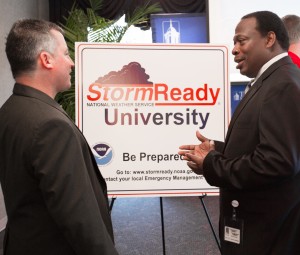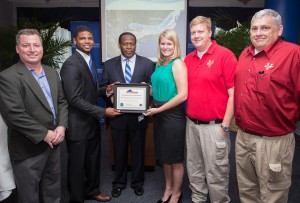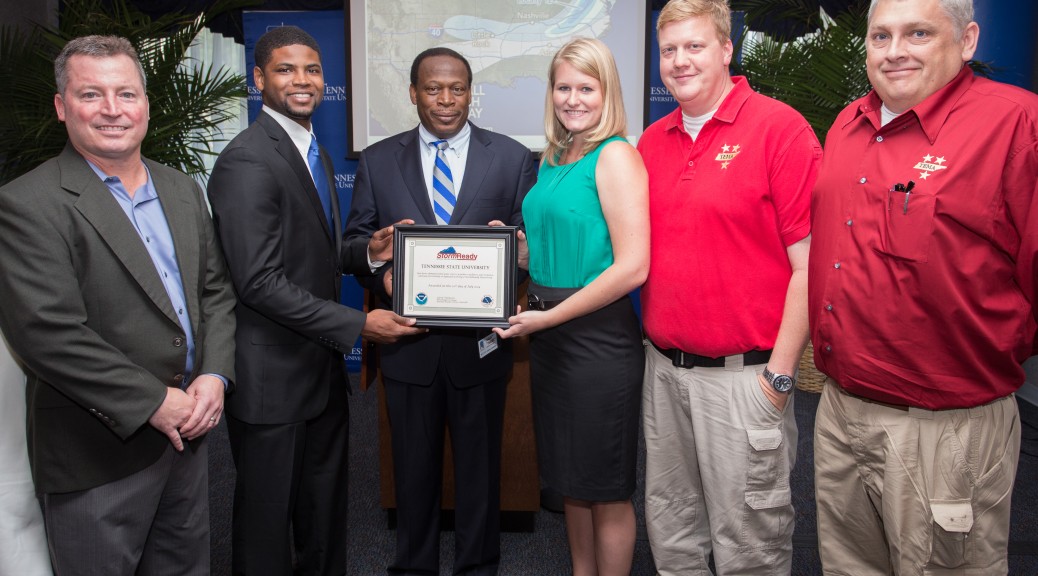
NASHVILLE, Tenn. (TSU News Service) – Tennessee State University is well prepared to protect its students, faculty and staff from severe weather, the National Weather Service announced Thursday, July 10, when it designated the University as a StormReady institution.
The NWS said TSU has met all the “rigorous criteria” for a StormReady designation by developing an all-hazard safety plan and communications infrastructure, as well as actively promoted all hazardous weather safety through public awareness activities and training.
“There is nothing more important than keeping our community of students, faculty and staff safe on our campus,” said Dr. Glenda Glover, President of Tennessee State University. “This designation shows that we are holding to our commitment to parents and other community stakeholders that TSU is doing everything possible to ensure a safe and secure environment for our students.”

At a presentation ceremony on campus, Tom Johnstone, warning coordination meteorologist with the National Weather Service, congratulated the University for receiving the StormReady designation. He applauded the administration, the Emergency Management team and staff for their dedication and hard work in “putting all the right pieces together” to achieve the designation.
“Tennessee State University is prepared for the StormReady designation,” Johnstone declared. “It took tremendous work to fine-tune all that was necessary to earn the certification required for this designation, and this university and this community need to be congratulated for a great job.”
Dr. Curtis Johnson, associate vice president for Administration, who is in charge of Emergency Management, thanked the campus police, students and staff for their cooperation in doing what was necessary to earn the NWS certification.
“Being storm ready reaffirms Tennessee State University’s commitment to protection of life and property, and all of you have been helpful in allowing us to achieve that,” Johnson said. “We look forward to making TSU and the community better and safer.”
As a mark of designation and recognition, Johnson announced that the NWS StormReady signage would be placed at the two major entrances to the University.
NWS meteorologist Brittney Coleman, while acknowledging that natural disasters are inevitable, said preparing for them must always be taken seriously.
“Tennessee State University has really done a tremendous job in preparing itself and the community in the case of bad weather,” Coleman said. “We have been working with the campus team to make sure we had everything in place to be ready for this designation. All residence halls now have weather alert radios to keep them connected to the National Weather Service in case of emergency.”
Also participating in the ceremony were representatives from the Tennessee Emergency Management Agency, who lauded the agency’s partnership with the University. They were Middle Tennessee Regional Director, Chris Johnson; and Area Coordinator, Brent Morse.
Speaking on behalf of the community, the Reverend Jimmy D. Greer Sr., pastor of Nashville’s Friendship Baptist Church, thanked the University for its community partnership.
“We applaud Dr. Glover for holding up to her commitment since arriving at this campus to ensure that the community is actively involved in any endeavor necessary for the promotion of this university,” Greer said. “We thank the university, the National Weather Service, TEMA and all the people that took part in making this achievement possible.”
Dr. Mark Hardy, vice president for Academic Affairs, representing Dr. Glover, who was traveling, said TSU’s effort in ensuring a safe weather environment for its faculty, staff and student, ties in with some major research efforts at the University.
Specifically, the vice president mentioned a more than $200,000 National Science Foundation-funded on-going research project in the College of Engineering to develop a simulation model that would help predict storm surge in a timely manner to better prepare inland and coastal dwellers for the storm.
“An assistant professor of Mechanical and Manufacturing Engineering (Muhammad Akbar) is using computational fluid dynamics and mathematical models to predict flooding caused by storm surges that bring ocean water onto land, causing major devastation, and erosion to cities and coastal wetlands,” said Hardy. He thanked NWS for the recognition, adding that the StormReady designation “speaks to the volume of work we are doing not to only provide a safe environment for our students, but to also give them the highest quality of education.”
The packed ceremony in the President’s Dining Room on the main campus brought together an array of state, local and community partner leaders and representatives, including the office of Congressman Jim Cooper, and the Executive Director of Nashville JUMP (Jefferson Street United Merchants Partnership), Sharon Hurt.
TSU is one of only seven institutions in the State to receive the StormReady University designation.
Department of Media Relations
Tennessee State University
3500 John Merritt Boulevard
Nashville, Tennessee 37209
615.963.5331
About Tennessee State University
With nearly 9,000 students, Tennessee State University is Nashville’s only public university, and is a comprehensive, urban, co-educational, land-grant university offering 38 undergraduate, 22 graduate and seven doctoral programs. TSU has earned a top 20 ranking for Historically Black Colleges and Universities according to U.S. News and World Report, and rated as one of the top universities in the country by Washington Monthly for social mobility, research and community service. Founded in 1912, Tennessee State University celebrated 100 years in Nashville during 2012. Visit the University online at tnstate.edu.
